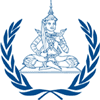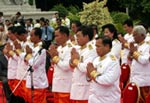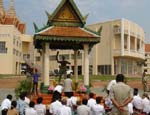International Tribunal Spotlight:
Extraordinary Chambers in the Courts
of Cambodia
 Introduction
Introduction
During the nearly four year reign of the Khmer Rouge in
The international community has demanded an accounting for these atrocities over the past 20 years. Finally, on March 17, 2003 the United Nations reached an agreement with the Cambodian government to create an international criminal tribunal to try former Khmer Rouge leaders. This came about only after five years of negotiations and 24 years after the Khmer Rouge were driven from power.
The official name of the Tribunal is the Extraordinary Chambers in the Courts of Cambodia for the Prosecution of Crimes Committed During the Period of Democratic Kampuchea.
The purposes of the Tribunal are (1) to offer justice for victims and survivors by prosecuting “senior leaders and those most responsible” for the mass crimes of the Khmer Rouge; (2) to prevent similar atrocities in the future; and (3) to demonstrate to younger generations what happened during the years of Khmer Rouge rule.
Judges from the
The Accused
Trials of four Khmer Rouge leaders are scheduled to begin in 2007, although no firm date has been set for their beginning. The four senior Khmer Rouge leaders who will most likely face trial are:
Ieng Sary – KR Foreign Minister
Nuon Chea – Pol Pot’s chief lieutenantKhieu Samphan – KR head of state
Kung Khek Ieu – Director of a KR interrogation and torture chamber
Another indicted KR official, Chhit Choeum, also known as Ta Mok, a former Army chief nicknamed “The Butcher,” died last summer. Other KR leaders have avoided prosecution due to old age or poor health.
Structure and Composition
 |
| The Cambodian Tribunal Court Swearing In Ceremony |
Each trial will be conducted by a panel of judges, which must contain at least one international judge. Cases will be decided by a majority, but the vote of at least one international judge is required for a decision. The maximum penalty that can be given is life imprisonment. The Tribunal has not yet agreed on the difficult task of formulating rules of procedure for the conduct of trials. The Tribunal is also attempting to establish a support office for defense lawyers.
Prosecutors for the Tribunal moved into their offices on July 10 of this year. Judges took an oath of office on July 3, 2006. The Prosecutor’s office has already accumulated detailed records of Khmer Rouge atrocities. Veteran Canadian lawyer and international prosecutor Robert Petit will serve as chief co-prosecutor. He has experience in the international criminal tribunals for Rwanda, East Timor, Kosovo, and Sierra Leone.
The Tribunal, during the peak of its work, which is limited to three years, is expected to employ a staff of 200 Cambodians, and 100 foreigners designated by the United Nations.
The trials will be held in a former military headquarters building in the outskirts of Phnom Penh. The building is near one of the killing fields used by the Khmer Rouge where thousands of bodies are buried.
Cost/Budget
 |
| The Cambodian Tribunal Court Located near the killing fields |
The total three year budget for the Tribunal is an estimated
$56.3 million. Voluntary contributions from United Nations
members will make up $43 million. Thirteen members of the
United Nations have already pledged a total of $38.5 million
for Tribunal operations. The thirteen UN members are
For More Information
Extraordinary Chambers in the Courts of Cambodia
Open Society Justice Imitative
International Center for Transitional Justice
(Note: some information for this article was obtained from materials put together by the Global Policy Forum).
James G. Apple, Co-Editor, International Judicial
Monitor and President, International Judicial Academy
